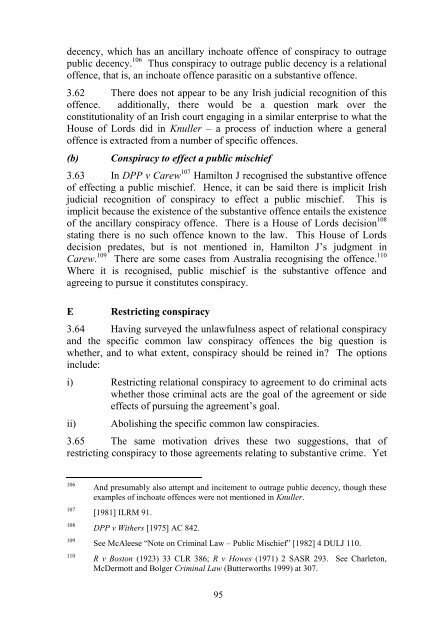Consultation Paper on Inchoate Offences - Law Reform Commission
Consultation Paper on Inchoate Offences - Law Reform Commission
Consultation Paper on Inchoate Offences - Law Reform Commission
You also want an ePaper? Increase the reach of your titles
YUMPU automatically turns print PDFs into web optimized ePapers that Google loves.
decency, which has an ancillary inchoate offence of c<strong>on</strong>spiracy to outragepublic decency. 106 Thus c<strong>on</strong>spiracy to outrage public decency is a relati<strong>on</strong>aloffence, that is, an inchoate offence parasitic <strong>on</strong> a substantive offence.3.62 There does not appear to be any Irish judicial recogniti<strong>on</strong> of thisoffence. additi<strong>on</strong>ally, there would be a questi<strong>on</strong> mark over thec<strong>on</strong>stituti<strong>on</strong>ality of an Irish court engaging in a similar enterprise to what theHouse of Lords did in Knuller – a process of inducti<strong>on</strong> where a generaloffence is extracted from a number of specific offences.(b)C<strong>on</strong>spiracy to effect a public mischief3.63 In DPP v Carew 107 Hamilt<strong>on</strong> J recognised the substantive offenceof effecting a public mischief. Hence, it can be said there is implicit Irishjudicial recogniti<strong>on</strong> of c<strong>on</strong>spiracy to effect a public mischief. This isimplicit because the existence of the substantive offence entails the existenceof the ancillary c<strong>on</strong>spiracy offence. There is a House of Lords decisi<strong>on</strong> 108stating there is no such offence known to the law. This House of Lordsdecisi<strong>on</strong> predates, but is not menti<strong>on</strong>ed in, Hamilt<strong>on</strong> J‟s judgment inCarew. 109 There are some cases from Australia recognising the offence. 110Where it is recognised, public mischief is the substantive offence andagreeing to pursue it c<strong>on</strong>stitutes c<strong>on</strong>spiracy.ERestricting c<strong>on</strong>spiracy3.64 Having surveyed the unlawfulness aspect of relati<strong>on</strong>al c<strong>on</strong>spiracyand the specific comm<strong>on</strong> law c<strong>on</strong>spiracy offences the big questi<strong>on</strong> iswhether, and to what extent, c<strong>on</strong>spiracy should be reined in? The opti<strong>on</strong>sinclude:i) Restricting relati<strong>on</strong>al c<strong>on</strong>spiracy to agreement to do criminal actswhether those criminal acts are the goal of the agreement or sideeffects of pursuing the agreement‟s goal.ii)Abolishing the specific comm<strong>on</strong> law c<strong>on</strong>spiracies.3.65 The same motivati<strong>on</strong> drives these two suggesti<strong>on</strong>s, that ofrestricting c<strong>on</strong>spiracy to those agreements relating to substantive crime. Yet106107108109110And presumably also attempt and incitement to outrage public decency, though theseexamples of inchoate offences were not menti<strong>on</strong>ed in Knuller.[1981] ILRM 91.DPP v Withers [1975] AC 842.See McAleese “Note <strong>on</strong> Criminal <strong>Law</strong> – Public Mischief” [1982] 4 DULJ 110.R v Bost<strong>on</strong> (1923) 33 CLR 386; R v Howes (1971) 2 SASR 293. See Charlet<strong>on</strong>,McDermott and Bolger Criminal <strong>Law</strong> (Butterworths 1999) at 307.95
















